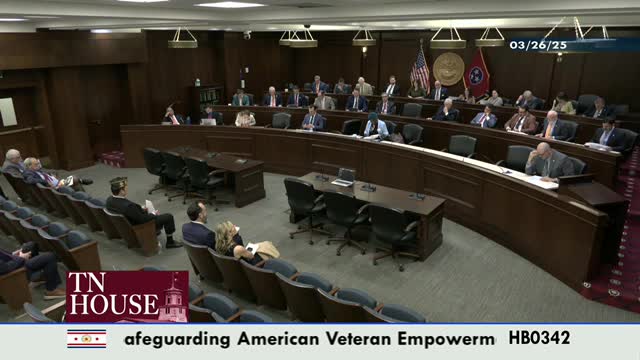Tennessee legislators propose consumer protections for veterans' disability claims process
This article was created by AI summarizing key points discussed. AI makes mistakes, so for full details and context, please refer to the video of the full meeting. Please report any errors so we can fix them. Report an error »

In a recent meeting of the Tennessee State Legislature's Commerce Committee, lawmakers discussed critical legislation aimed at reforming the veterans' disability claims process. The current system, characterized by its complexity and significant backlog, has left many veterans struggling to navigate their options for filing claims.
The proposed legislation seeks to enhance consumer protection for veterans by introducing regulations on the services provided by both accredited and unaccredited claims representatives. Currently, veterans can file claims independently, seek assistance from accredited organizations, or turn to unaccredited paid services. However, the latter group has raised concerns due to the presence of "bad actors" who exploit veterans seeking help.
The bill aims to establish ethical standards and accountability within this largely unregulated industry. Key provisions include mandating that fees for services are contingent on successful outcomes, prohibiting upfront and referral fees, and requiring transparency about free options available through local veteran service officers. Additionally, the legislation would impose civil and criminal penalties for violations, enforced by the Tennessee Attorney General.
Supporters of the bill argue that it preserves veterans' rights to choose their representation while safeguarding them from exploitation. They emphasize the need for regulation to protect veterans from misleading claims and unethical practices.
During the meeting, Justin Johnson, a combat veteran and representative of Tennessee veterans, voiced strong concerns about the potential impact of the proposed SAVE Act, which could allow unaccredited claims companies to operate more freely. Johnson highlighted that such changes could undermine the work of accredited veteran service officers and lead to an increase in fraudulent claims, ultimately harming veterans who rely on these services.
The discussions underscored the urgent need for reform in the veterans' claims process, as lawmakers consider how best to balance access to services with the protection of veterans' rights and interests. As the committee continues to deliberate, the outcome of this legislation could significantly influence the landscape of veteran assistance in Tennessee.
The proposed legislation seeks to enhance consumer protection for veterans by introducing regulations on the services provided by both accredited and unaccredited claims representatives. Currently, veterans can file claims independently, seek assistance from accredited organizations, or turn to unaccredited paid services. However, the latter group has raised concerns due to the presence of "bad actors" who exploit veterans seeking help.
The bill aims to establish ethical standards and accountability within this largely unregulated industry. Key provisions include mandating that fees for services are contingent on successful outcomes, prohibiting upfront and referral fees, and requiring transparency about free options available through local veteran service officers. Additionally, the legislation would impose civil and criminal penalties for violations, enforced by the Tennessee Attorney General.
Supporters of the bill argue that it preserves veterans' rights to choose their representation while safeguarding them from exploitation. They emphasize the need for regulation to protect veterans from misleading claims and unethical practices.
During the meeting, Justin Johnson, a combat veteran and representative of Tennessee veterans, voiced strong concerns about the potential impact of the proposed SAVE Act, which could allow unaccredited claims companies to operate more freely. Johnson highlighted that such changes could undermine the work of accredited veteran service officers and lead to an increase in fraudulent claims, ultimately harming veterans who rely on these services.
The discussions underscored the urgent need for reform in the veterans' claims process, as lawmakers consider how best to balance access to services with the protection of veterans' rights and interests. As the committee continues to deliberate, the outcome of this legislation could significantly influence the landscape of veteran assistance in Tennessee.
View full meeting
This article is based on a recent meeting—watch the full video and explore the complete transcript for deeper insights into the discussion.
View full meeting